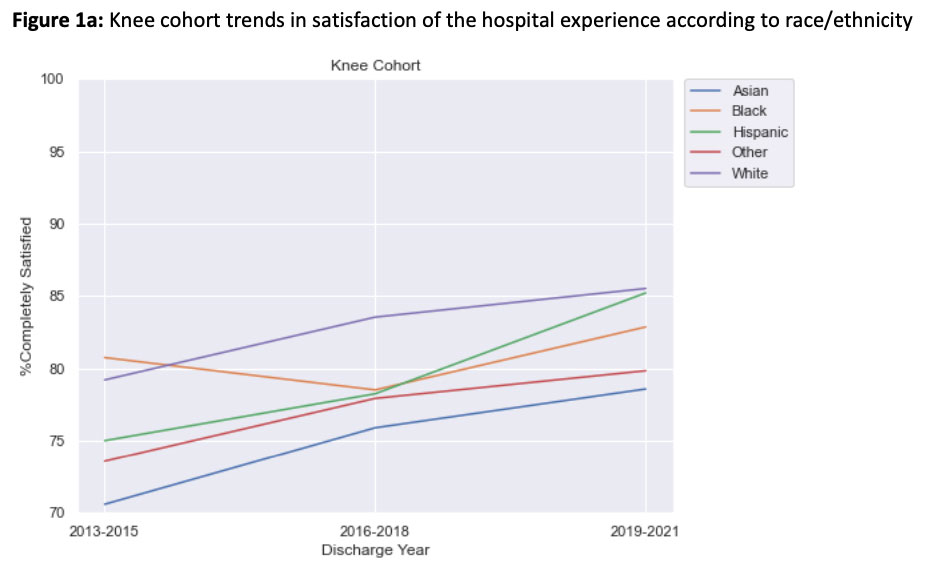Session Information
Session Type: Poster Session B
Session Time: 9:00AM-10:30AM
Background/Purpose: Racial and ethnic disparities in total joint arthroplasty utilization have been extensively reported, demonstrating significantly lower rates of utilization among Black and Hispanic patients; dissatisfaction with the hospital experience may be a deterrent. The Press Ganey (PG) inpatient survey is widely used to assess patient satisfaction with the hospital experience. Although disparities in patient satisfaction have been reported between White and Black patients, it is not known if other racial or ethnic minorities are affected, or how these disparities have evolved over time.
Methods: A retrospective cohort study was conducted identifying patients undergoing primary total hip (THA) and total knee arthroplasty (TKA) at a large orthopedic specialty hospital from 2013–2021 who provided PG survey responses. Patients who resided in New York, New Jersey, or Connecticut at the time of surgery were included in the analysis. The primary outcome was the PG overall assessment score, calculated as the mean of a patient’s ratings for the three questions in the “Overall Assessment” section: 1) how well staff worked together, 2) the likelihood of recommending the hospital to others, and 3) overall rating of care. Scores were dichotomized as either completely satisfied (score = 100) or not completely satisfied (score < 100). Additional demographic variables were collected including sex, age, race, and ethnicity from the hospital record. Descriptive statistics were calculated and compared using chi-square test for categorial variables and t-test for continuous variable. Rate of being completely satisfied by race and ethnicity was calculated and trended over time.
Results: There were 13,704 patients who underwent TKA and 14,717 who had THA included in the analysis. A higher proportion of men were completely satisfied compared to women in both the hip and knee cohorts (e.g. 60.6% for men vs. 39.5% for women following TKA, p=0.004, Table 1). The proportion of patients who reported to be completely satisfied following both TKA and THA increased for all patients over the study period. However, disparities between White and Black patients persisted over time (Figure 1a and 1b). Similar trends were observed between White, Asian, and Hispanic patients, with White patients more likely to be completely satisfied.
Conclusion: We found disparities in overall patient satisfaction following TKA and THA between White, Black, Hispanic, and Asian patients from 2013-2021. Although the overall proportion of patients reporting complete satisfaction with the hospital experience using the Press-Ganey survey increased over time, racial and ethnic disparities persisted without any signs of improvement. These trends may help explain broader disparities in overall utilization of both TKA and THA among minority groups, who are historically much less satisfied with their overall hospital experience. Further investigation is warranted to help identify factors which contribute to these temporal disparities and develop strategies to mitigate their effects on an individual hospital, state, and national level.
To cite this abstract in AMA style:
Amen T, Zhang, Y, Gibbons J, Burke O, Bass A, Russell L, do h, Lai Y, Parks M, Figgie M, Mehta B, Goodman S. Racial Disparities in Patient Satisfaction Following Total Joint Arthroplasty: A Contemporary Trends Analysis from 2013-2021 [abstract]. Arthritis Rheumatol. 2022; 74 (suppl 9). https://acrabstracts.org/abstract/racial-disparities-in-patient-satisfaction-following-total-joint-arthroplasty-a-contemporary-trends-analysis-from-2013-2021/. Accessed .« Back to ACR Convergence 2022
ACR Meeting Abstracts - https://acrabstracts.org/abstract/racial-disparities-in-patient-satisfaction-following-total-joint-arthroplasty-a-contemporary-trends-analysis-from-2013-2021/



